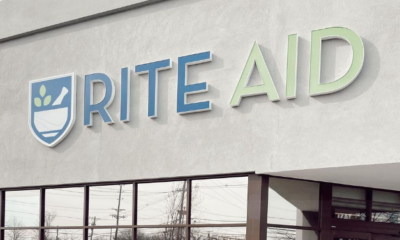ECONOMY
20 Quirky Tax Breaks You Should Know Before You File
Published
3 months agoon

Shutterstock
Taxes are often seen as a necessary chore, but they can also offer surprising opportunities for savings. Across the United States, there are numerous quirky tax breaks that many people don’t realize they qualify for. From deductions for fostering animals to credits for adopting energy-efficient technology, these tax benefits cover a variety of unexpected expenses. Understanding these unusual tax provisions can help you maximize your returns and put some extra money back in your pocket. Dive into this list of 20 weird tax breaks to see if you might qualify for some surprising savings!
Pet Relocation Expenses

Shutterstock
Moving to a new location for work can be expensive, but did you know your pet’s travel costs might be deductible? If your relocation qualifies as a job-related move, the IRS may allow you to include your pet’s transportation fees in your moving expense deduction. This can include airfare for your pet or the cost of a specialized pet transport service. It’s a quirky but helpful way to keep your beloved companion by your side without breaking the bank.
Cat as Pest Control

Shutterstock
If you own a business property and have a cat that keeps rodents at bay, you might qualify for a tax break. The cost of food, care, and even vet visits for the feline can sometimes be deducted as a business expense. This deduction applies when the cat provides a direct benefit to your business, such as protecting inventory or equipment. It’s a purr-fectly practical way to appreciate your furry workforce.
Clarinet Lessons for Medical Purposes

Shutterstock
Music lessons for children are often considered extracurricular, but they can also be therapeutic. If a doctor prescribes clarinet lessons to help correct a child’s overbite, the associated costs may be deductible as a medical expense. This unusual tax break highlights how diverse medical needs can lead to unexpected deductions. It’s a great reminder to look into any medically recommended activities for potential savings.
Swimming Pool as a Medical Expense

Shutterstock
Installing a swimming pool might seem like a luxury, but it can serve a medical purpose for some individuals. If a doctor recommends swimming to alleviate arthritis or another condition, the installation and maintenance costs of the pool may be partially deductible. However, the IRS typically requires proof that the pool is primarily for medical use. This deduction makes an otherwise costly addition a bit more affordable for those in need.
Babysitter During Volunteer Work

Shutterstock
Volunteering for charity is a noble pursuit, and the IRS recognizes the sacrifices involved. If you need to hire a babysitter while you perform volunteer work for a registered charity, you may deduct those costs as a charitable contribution. This deduction acknowledges the indirect expenses that come with giving your time to good causes. It’s a helpful way to offset the cost of supporting your community.
Weight Loss Programs

Shutterstock
Losing weight is not only good for health but can also be a tax benefit under specific circumstances. If a doctor prescribes a weight loss program to treat a medical condition like obesity or hypertension, the costs may be deductible as medical expenses. This includes fees for membership, counseling, and even certain dietary products. It’s a surprising way to turn a personal health journey into potential savings.
Alaskan Whaling Captain Expenses

Shutterstock
Alaskan Native whaling captains can benefit from a unique tax break that recognizes their cultural and subsistence activities. Expenses up to $10,000 for equipment, fuel, and supplies related to whaling are deductible. This tax provision supports the preservation of traditional practices in a modern world. It’s a remarkable example of how tax laws can be tailored to specific communities.
Charitable Contributions of Goods

Shutterstock
Donating items like clothing, food, or other goods to charity isn’t just a kind gesture—it can save you money on your taxes. The fair market value of your donations may be deductible, provided you keep proper records and receipts. This applies to both individuals and businesses contributing unsold inventory or surplus. It’s a win-win for you and the organizations you support.
Improvements for Energy Efficiency

Shutterstock
Making your home more energy-efficient not only reduces utility bills but can also qualify you for federal tax credits. Installing solar panels, energy-efficient windows, or a green roof can lead to significant savings. These improvements often come with specific rebates or tax incentives based on their environmental impact. By investing in sustainable upgrades, you help the planet and your wallet at the same time.
Exotic Dancer Expenses

Shutterstock
The IRS allows deductions for professional expenses, and exotic dancers have successfully written off costs for costumes, makeup, and even body enhancements. These expenses are considered necessary to their line of work and therefore qualify as business-related deductions. It’s a fascinating example of how tax laws accommodate a wide range of professions. This flexibility underscores the importance of documenting any work-related expenditures, no matter how unconventional.
Bison Tax Break

Shutterstock
Raising bison may seem like an unusual activity, but it comes with its own set of tax benefits. Farmers who keep bison for agricultural or conservation purposes may qualify for unique deductions and credits. These tax breaks encourage sustainable farming practices and the preservation of this iconic species. If you’re involved in bison farming, it’s worth exploring these incentives to boost your bottom line.
Tree Removal for Safety

Shutterstock
Trees can add beauty to your property, but they can also pose a danger if they’re diseased or unstable. If you need to remove a tree for safety reasons, and it’s documented as necessary by a professional, the costs might be deductible. This is especially true if the tree removal protects your home or structures from damage. It’s an unusual yet practical tax break for maintaining a safe property.
Foster Animal Expenses

Shutterstock
Fostering animals for a registered charity can bring unexpected tax benefits. Costs such as food, bedding, and veterinary care may be deductible if they are directly related to fostering. This tax break recognizes the invaluable contributions of those who care for animals in need. It’s a small but meaningful way to support your efforts in providing temporary homes for pets.
Retired Racehorse Adoption

Shutterstock
Adopting a retired racehorse isn’t just a noble act—it can also qualify for tax deductions. Certain costs associated with the care and upkeep of these horses may be eligible for tax breaks, particularly if the adoption is through a registered organization. These incentives aim to promote humane treatment and provide new homes for animals after their racing careers. It’s a unique way to combine compassion with financial benefits.
Home Office for Side Hustles

Shutterstock
Running a side hustle from home can open up opportunities for tax deductions. If you use a specific area of your home exclusively for business purposes, you can deduct a portion of your rent, utilities, and maintenance. This deduction applies even to unconventional side gigs, like crafting or online tutoring. It’s a handy way to offset the costs of pursuing your entrepreneurial dreams.
Armed Forces Reservists Travel

Shutterstock
Military reservists often travel significant distances for training or duties, and the IRS provides relief for these expenses. If you travel more than 100 miles from home for reserve activities, unreimbursed travel costs may be deductible. This includes transportation, lodging, and meals incurred during your service. It’s a valuable benefit that acknowledges the sacrifices reservists make to serve their country.
Costs of Breastfeeding Supplies

Shutterstock
Breastfeeding comes with its own set of expenses, and some of them are tax-deductible. Items like breast pumps and storage bottles are considered medical supplies and may qualify as a medical expense deduction. These items must be used specifically for breastfeeding purposes to be eligible. This tax break provides a little extra support for new mothers managing the costs of caring for their babies.
Adoption-Related Costs

Shutterstock
Adopting a child is a life-changing event, and it comes with various financial incentives. The IRS allows deductions for certain adoption-related expenses, including legal fees, travel costs, and court expenses. These deductions help offset the often high costs of adoption. By easing the financial burden, this tax benefit encourages more families to open their hearts and homes to children in need.
Therapy Animals

Shutterstock
Therapy animals provide emotional and physical support to their owners, and the IRS recognizes their value. The cost of caring for a therapy animal, including food and veterinary bills, may qualify as a deductible medical expense. To claim this deduction, the animal must be prescribed by a doctor for a specific medical condition. It’s a heartwarming way to receive financial support for your furry helper.
Volunteer Firefighters and EMTs

Shutterstock
Volunteer firefighters and EMTs often dedicate their time and skills for the betterment of their communities. In certain states, these individuals may qualify for tax credits or deductions related to their service. This could include training expenses, equipment costs, or even a general service credit. It’s a small token of appreciation for their invaluable contributions.
Conclusion

Shutterstock
Taxes don’t have to be a burden when you know how to uncover hidden opportunities for deductions and credits. These unusual tax breaks prove that even the quirkiest expenses can sometimes work in your favor. By staying informed and consulting with a tax professional, you can take full advantage of these benefits and more. Whether you’re a bison farmer or a parent moving cross-country with a pet, there’s a tax break out there for you. Remember, a little knowledge can go a long way in keeping your finances healthy and your tax bill manageable!
Related Topics:

More Money + Investing
-


Consumer Confidence Drops As Gas And Grocery Prices Remain Stubbornly…
-


Overtime Pay Could Extend To Millions Of Salaried Workers Earning…
-


Taco Bell Tops Entrepreneur’s Franchise 500 List for Third Year…
-


Elon Musk Threatens To Sue Anti-Defamation League Over Declining X…
-


Unemployment Ticks Up to 3.8% In August Jobs Report
-


Student Loan Interest Resumes Sept. 1, With Payments Due in…
-


10 U.S. Cities People Are Fleeing In Droves
-


From Eco-Friendly Startup to Amazon Dominance: The Story of One…
-


Visa, Mastercard Share Prices Jump On Report Of Upcoming Merchant…
-


Goldman Sachs Lowers US Recession Chances To 15% Over Next…
-


8 Great Part-Time Jobs For Retirees
-


Rite Aid May Be Headed For Bankruptcy Amid Opioid Lawsuits